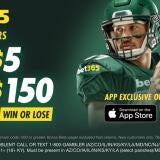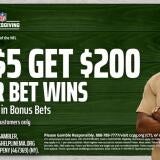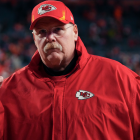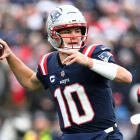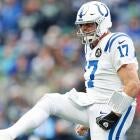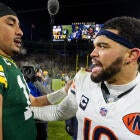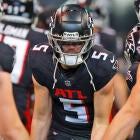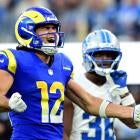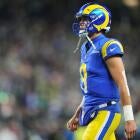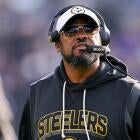Andy Reid becomes fifth head coach to face former team in Super Bowl; here's how the others have fared
The previous four coaches had mixed results against their old team

Andy Reid was asked the inevitable question moments after the Chiefs earned the right to face the Eagles in Super Bowl LVII.
What will it be like facing your former team?
"I'm happy for them," Reid said of the Eagles, via Yahoo Sports. "I'm happy for the city. They're passionate. They love football.
"I can't wait till Kansas City and Philly clash. I mean, it's gonna be awesome. What a great Super Bowl it'll be."
After winning a ring on Mike Holmgren's staff in Green Bay, Reid began a highly successful 14-year run with the Eagles, a franchise that had fallen on hard times prior to his arrival in 1999. Reid quickly helped elevate the franchise into one of the NFL's elite clubs. Under Reid's watch, Philadelphia advanced to five NFC title games that included a conference title in 2004. Reid's 140 wins is the most all-time by an Eagles coach.
The only thing Reid didn't do in Philadelphia was win a Super Bowl, something the Eagles did for the first time as a franchise in 2017. Reid finally won his coveted ring as a head coach in 2019 after helping the Chiefs snap their 50-year championship drought. He is hoping to win his second ring after helping the Chiefs return to the Super Bowl for a third time in four years.
Reid will become the fifth head coach to coach against his former team in the playoffs. Here's a look at how the previous four fared against their old team in the big game.
Weeb Ewbank, Super Bowl III
Result: 16-7 W
Ewbank won back-to-back NFL titles as the Colts coach in the late 1950s. But he was unceremoniously let go by the team after a 7-7 campaign in 1962. Ewbank quickly found a landing spot in New York with the Jets, a new team that was part of the recently-created American Football League (AFL).
The Jets toiled through several years of mediocrity before breaking through with an 11-3 record in 1968. New York boasted the AFL's second-ranked scoring offense and fourth-ranked scoring defense that season. Led by future Hall of Fame quarterback Joe Namath, the Jets defeated the Raiders in the AFL title game for the right to face the Colts in Super Bowl III.
An 18-point favorite, the Colts lost just one game during the regular season. Five turnovers, however, loomed large in what remains the biggest upset in pro football history. The Jets' defense picked off NFL MVP Earl Morrall three times and Johnny Unitas -- who relieved Morrall in the second half -- another time. The Jets' offense was led by Namath and running back Matt Snell, who gashed the Colts' talented defense to the tune of 121 yards on 30 carries.
Ewbank is often credited for shortening Namath's drop back in order to offset the Colts' ferocious pass rush. The Jets had such a control on the game that Namath did not have to attempt a single pass in the fourth quarter.
Jets-Colts. 18-point underdogs. The guarantee.
— New York Jets (@nyjets) October 5, 2019
You know how it finished.
No. 6 on the NFL's 100 Greatest Games list: Super Bowl III pic.twitter.com/8FfpXY9yc0
Dan Reeves, Super Bowl XXXIII
Result: 34-19 L
Reeves has one of the most interesting careers in pro football history. He was a versatile halfback on Tom Landry's Cowboys teams of the late '60 and early '70s and was a player/coach when Dallas won its first title in 1971. He won another Super Bowl as a Cowboys assistant coach before being named Broncos head coach in 1981.
Along with John Elway (who came to Denver in 1983), Reeves helped the Broncos rise to the top of the AFC during the 1980s. The Broncos appeared in three Super Bowls over a four-year span but lost by wide margins in each game. Denver's third Super Bowl during that span, a 55-10 loss to the 49ers, remains the widest margin of defeat in Super Bowl history.
Like Ewbank, Reeves was let go by his former employer after a .500 season. Reeves then has a so-so run with the Giants before relocating to Atlanta in 1997. In 1998, he became the third coach to lead three different franchises to the playoffs after leading the Falcons to a 14-2 record. Reeves, who was hospitalized during the final two games of the regular season to under quadruple-bypass heart surgery, was named Coach of the Year.
Reeves' "Dirty Bird" Falcons edged the 49ers in the divisional round before defeating the 15-1 Vikings in one of the biggest upsets in NFL postseason history. As a reward, the Falcons would face the defending champion Broncos, who won 13 straight games that season before suffering their first loss.
The game wasn't a contest, as Elway threw for 336 yards and scored two touchdowns in the final game of his Hall of Fame career.
John Elway's 80-yard rollout rainbow to Rod Smith for a #Broncos six in Super Bowl XXXIII — the final touchdown pass of Elway's brilliant NFL career.
— Kevin Gallagher (@KevG163) February 1, 2022
23 years ago today#BroncosCountry pic.twitter.com/Idd2wkbmp8
Jon Gruden, Super Bowl XXXVII
Result: 48-21 W
Gruden was so in tune with the Raiders' offense that he actually mimicked Oakland quarterback Rich Gannon during Buccaneers practices leading up to the game. Gruden's knowledge of the Raiders' offense was a major advantage in Super bowl XXXVII, with the Buccaneers' defense being privy to all of Oakland's audibles (they didn't change them in the year following Gruden's departure).
Gruden, who had coached the Raiders to the divisional round of the playoffs the season before, watched as his defense picked off Gannon a Super Bowl record five times. A record three of those picks were returned for scores as Tampa Bay's defense scored as many points as Oakland's offense.
The Buccaneers' offense also played a role in the win by rolling up 365 yards of total offense. Brad Johnson threw a pair of touchdowns, while running back Michael Pittman picked up 124 yards on 29 carries.
In "The Pirate Bowl," it was the @Buccaneers' defense that delivered the offensive punch against the Raiders.#OTD in 2003, a Super Bowl-record THREE pick sixes fueled Tampa Bay's 48-21 blowout win over Oakland in Super Bowl XXXVII.
— Pro Football Hall of Fame (@ProFootballHOF) January 27, 2023
🎥: @NFL pic.twitter.com/S4zOCaj7oW
Pete Carroll, Super Bowl XLIX
Result: 28-24 L
Carroll had the unenviable task of replacing legendary coach Bill Parcells after Parcells guided the Patriots to the Super Bowl in 1996. Carroll had success but was ultimately fired after a .500 season in 1999 (see a trend here?). He was replaced by Bill Belichick, who along with Tom Brady quickly turned the Patriots into a dynasty.
During that time, Carroll built his own dynasty on the college level, leading USC to back-to-back national titles. Carroll returned to the NFL with Seattle in 2010 and immediately elevated it into a playoff team. By his fourth season, Carroll led the Seahawks to the franchise's first Super Bowl win on the strength of their "Legion of Boom" defense.
Seattle was in the midst of building a dynasty when they faced Belichick's Patriots in Super Bowl XLIX. The Seahawks built a 24-14 lead and appeared to be on their way to winning back-to-back titles before Brady led two Patriots fourth quarter scoring drives to take the lead.
Trailing late in the game, Seattle was on the doorstep of winning the game following Russell Wilson's miraculous 33-yard completion to Jermaine Kearse. But the game was won after Malcolm Butler stepped in front of Wilson's pass attempt after Carroll had decided to throw the ball instead of handing it to running back Marshawn Lynch one yard away from a title.
Six years ago, Malcolm Butler sealed Super Bowl XLIX with a goal-line interception 👀
— ESPN (@espn) February 1, 2021
(via @nflthrowback)pic.twitter.com/FLcCBUB1hl




